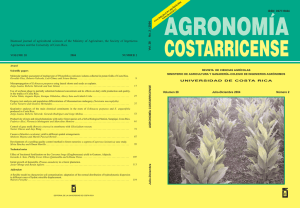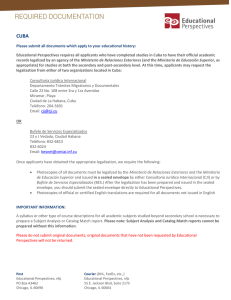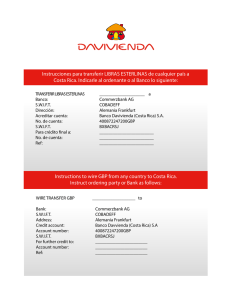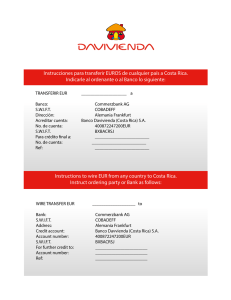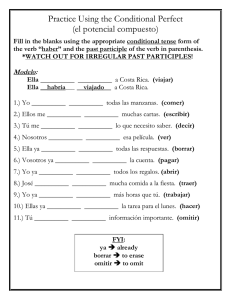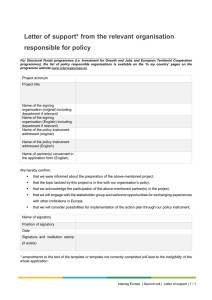Minutes of the meeting and list of participants
Anuncio
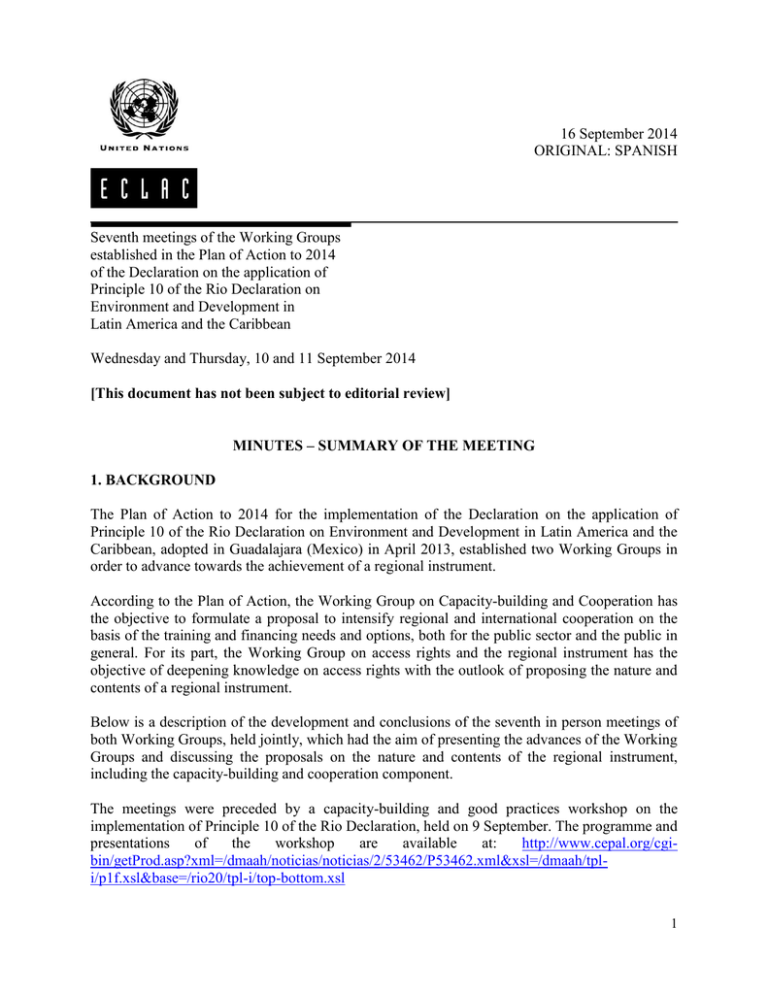
16 September 2014 ORIGINAL: SPANISH Seventh meetings of the Working Groups established in the Plan of Action to 2014 of the Declaration on the application of Principle 10 of the Rio Declaration on Environment and Development in Latin America and the Caribbean Wednesday and Thursday, 10 and 11 September 2014 [This document has not been subject to editorial review] MINUTES – SUMMARY OF THE MEETING 1. BACKGROUND The Plan of Action to 2014 for the implementation of the Declaration on the application of Principle 10 of the Rio Declaration on Environment and Development in Latin America and the Caribbean, adopted in Guadalajara (Mexico) in April 2013, established two Working Groups in order to advance towards the achievement of a regional instrument. According to the Plan of Action, the Working Group on Capacity-building and Cooperation has the objective to formulate a proposal to intensify regional and international cooperation on the basis of the training and financing needs and options, both for the public sector and the public in general. For its part, the Working Group on access rights and the regional instrument has the objective of deepening knowledge on access rights with the outlook of proposing the nature and contents of a regional instrument. Below is a description of the development and conclusions of the seventh in person meetings of both Working Groups, held jointly, which had the aim of presenting the advances of the Working Groups and discussing the proposals on the nature and contents of the regional instrument, including the capacity-building and cooperation component. The meetings were preceded by a capacity-building and good practices workshop on the implementation of Principle 10 of the Rio Declaration, held on 9 September. The programme and presentations of the workshop are available at: http://www.cepal.org/cgibin/getProd.asp?xml=/dmaah/noticias/noticias/2/53462/P53462.xml&xsl=/dmaah/tpli/p1f.xsl&base=/rio20/tpl-i/top-bottom.xsl 1 Annex 1 contains the list of participants of the meeting. It is worth noting that there were 1.109 views of the meeting and the workshop through web streaming. 2. DEVELOPMENT OF THE MEETING The Alternate Director of Foreign Policy of Costa Rica’s Ministry of Foreign Affairs, the delegate of Mexico on behalf of the Presiding Officers, ECLAC and a representative of the public delivered the opening remarks. On behalf of the Presiding Officers, the delegate from Mexico thanked the Government of Costa Rica for the warm welcome and ECLAC for the support it has provided in the process. In addition, he gave credit to the public for their high participation. On the other hand, he outlined that for his country the phase of the process that will begin in November shall intensify efforts and start negotiations to achieve a regional agreement with legal force that will allow to fully apply access rights in an effective manner. The delegate of Jamaica sent a welcome message in her capacity as coordinator of the Working Group on Capacity-Building and Cooperation to encourage discussions. The representative of the public highlighted the commitment of the countries and showed gratitude for the possibilities of participation that the process offers. He also recognized the Governments that had expressed their intention of adopting a binding agreement and requested that a minimum but ambitious content be achieved. ECLAC recalled that instrument to be negotiated is an agreement for implementation based on cooperation and capacity-building. The crafting of the text is led by the countries and the public, which participates in the process from the beginning. It stated that the aim of the meetings was to formulate a proposal on the nature and contents of the regional instrument, including the capacity-building and cooperation component, for consideration at the fourth meeting of the focal points in November. It also said that the good practices workshop had evidenced the developments and challenges in the region and, in this sense, highlighted the statement of the delegate from Saint Vincent and Grenadines, who called for an instrument that is legally binding, ambitious and flexible as allows for capacity-building considering the national circumstances of each country. Afterwards, the coordinators of the Working Groups delivered a presentation on the developments of their respective working groups and on the proposals on the nature and contents of the regional instrument and of the capacity-building and cooperation component that had been formulated on the basis of the inputs received from the Governments and the public. In a round of general remarks, the delegates of Argentina, Chile, El Salvador, Honduras and Peru and members of the public thanked the coordinators for their work and called for the reaching of agreements at the meeting. Peru, along with El Salvador, also supported a results-based approach. The delegate of Mexico underscored the importance of capacity-building and proposed the drafting of a proposal in this matter. The delegate from Trinidad and Tobago underlined the 2 need to create synergies with other processes such as the post-2015 agenda and the obligations contained in multilateral environmental agreements. Furthermore, it recalled, along with Argentina, the importance of considering the specific circumstances and needs of the countries in the region. A representative from the public of Saint Lucia stressed the need of encouraging and facilitating greater participation from the Caribbean as well as involving the judiciary. Argentina recalled the importance of considering financing needs. A representative from the public of Jamaica stood for the acknowledgement of ECLAC as the technical secretariat of the process and its fundamental role in capacity-building and cooperation. The analysis and discussion on the contents of the regional instrument was based on the proposals of the coordinators and took place in three sessions which dealt with the following matters: - Part One: discussion on the preamble, objective, use of terms or definitions, principles, and general provisions; - Part Two: discussion on access to information, participation and justice in environmental matters; and, - Part Three: discussion on the means of implementation (capacity-building and cooperation, financing), rules of procedure and institutional framework The contents agreed on in the discussion are included in the “San José Content for the regional instrument” which is available at http://bit.ly/1FQ7v1e. Some of the main agreements reached are found below: - - - First part Preamble: it was agreed to include references to international documents on access rights and to the documents adopted as part of the regional process on Principle 10. In addition, the rights-based approach was clarified and the recognition of the region’s diversity and multiculturalism was added. Use of terms or definitions: the term “public authority” was replaced by “competent national authority”. Principles: the principles of the Lima Vision shall be taken into consideration. Operative part General provisions: the right to live in a healthy environment and relation with human rights, collaboration between countries and non discrimination are added. Access to environmental information: o Guidelines: the term “maximum dissemination” is replaced by “maximum dissemination / publicity” and the term “control” with “control / oversight bodies” o Passive transparency: Accessibility of information: the term “exceptions” was added to “refusal”. “Mechanism to facilitate access to information” was supplemented with “and to recur to in case of refusal”. “Independent national body / institution to ensure compliance” was also added to this section. 3 - - - - o Active transparency: Consideration of specific issues: “information on permits authorizing large undertakings or environmental impacts” was replaced by “information on permits related to projects and activities that could generate significant environmental impacts”. “Information on environmental enforcement and compliance” is also added. Public access to participation in environmental decision-making: o Guidelines: “opportunity of incidence” is replaced by “modes of and mechanisms for participation” o Types of activities: “applicability to international forums and negotiations” is added. o Mechanisms and instruments for public participation: “spaces of incidence” is deleted. o Access to information: “relevant information” is supplemented with “and timely” o “Consideration of observations made by the public” is supplemented with “and grounds for the decision taken” Access to justice: o Guidelines: prompt response, prevention, independence and impartiality and effective remedy are added o Appeal mechanisms in cases of denial are established separately for each access right. o Facilitating access to justice: “official mechanisms for complaints and for cases where access has been denied, including use of new technologies” and “broad legal standing” are added and “new mechanisms” is deleted. o “Public prosecutors” and “ombudsmen” are added to “training of judicial and administrative officers and cooperation” o “Public awareness-raising and training” is added. Capacity-building and cooperation (the proposal from the Working Group on Capacity-Building and Cooperation is included in this section)1 Guidelines: “promotion of South-South cooperation” and “consideration of the specificities of cooperation for each access right” are added “Self-assessment of national needs and capacities” is included Forms of capacity-building and cooperation: triangular cooperation is added The modality “use of committees, councils and public-private platforms to address cooperation priorities and activities” is clarified Implementation, follow-up and evaluation: “appointment of focal points” is deleted and “the follow-up mechanism can establish or suggest capacity-building measures to support implementation by both the public and Governments” is added Resources: it is modified as follows: “mobilization of various types of resources from different sources” 1 It is agreed to establish a separate section on capacity-building and cooperation without prejudice to the fact that during the negotiations of the content of the instrument reference to capacity-building and cooperation could be included in each access right as deemed appropriate. 4 - - - Rules of procedure: Rules for public participation: is supplemented with “taking into consideration the experience gained during the regional Principle 10 process, and based on the Plan of Action” “Participation of the public in the application of the instrument at the national level” is deleted Institutional framework The term “significant” is deleted from the participation of the public in the meeting/conference of the signatory countries The term “compliance/follow-up mechanism” is replaced by “facilitation and/or followup mechanism” “Adoption, amendments, right to vote, signature, ratification, entry into force, reservations, withdrawal, depositary, authentic texts” is replaced by “final provisions” “Financial resources and mechanisms” is added The analysis and discussion on the nature of the instrument took place in a fourth session. To encourage the dialogue, Dr. Marcos Orellana delivered a brief presentation summarizing the result of the round-table discussion on International Law held on 1 August during the sixth meeting of the Working Group on Access Rights and Regional Instrument. Dr. Orellana stated that the instrument could have both a binding and non-binding approach, depending exclusively on the negotiations between the parties. Given the matters dealt with, he stressed that a binding instrument would be more adequate since it would be more effective in reaching the ultimate goal of the process. Another non-binding instrument would be redundant. He added that the issues at stake are a rights-based approach and the guarantee of rights as well as the establishment of institutional and normative elements. In this discussion that followed, the delegate of Panama mentioned the legislative similarities between the countries in the region when ratifying a future convention. The delegate of Colombia, for her part, asked about the value that the Sustainable Development Goals (“SDG”) and the Millennium Development Goals (“MDG”) would have, as they are non-binding but generate commitments at the international level. The delegate of Brazil asked about the positive aspects of not having a binding instrument such as a more simple entry into force. In light of the questions and comments, Dr. Orellana underlined one of the cardinal principles of international law: national law does not exempt from compliance of international law. He insisted that the content is to be defined in the political negotiation. At the same time, he said that the SDG and MDG were built on some matters that are already regulated by binding instruments, such as multilateral environmental agreements. In addition, he stated that there are examples of non-binding processes having a great impact but that the MDG experience had been mainly criticised for lacking a rights-based approach and accountability. Therefore, these approaches would lack enforceability which is so essential in access rights. On the other hand, he argued that non-binding instruments have a certain value. For example, they can introduce an issue in the international agenda and allow for the building of consensus that could later be included in binding instruments. Moreover, they can also specify the scope of binding obligations. However, 5 he clarified that a non-binding instrument would not sensu stricto enter into force but would simply be adopted. In this case, he stressed that the core of the instrument is enforceability of rights and for this, a binding instrument would be needed. The delegate of Mexico thanked ECLAC for the support provided and Dr. Orellana for his presentation. He highlighted the need of analysing each option mentioned in the Rio Declaration. He pointed to the 1992 Earth Summit, non-binding, as a model having a great impact. In addition, he said that nowadays the international community does not tackle major problems through international conventions. In fact, he stated that none of the three conventions that emerged from the Earth Summit have managed to solve the problems they aimed to tackle and have not achieved significant developments. For this reason, he called for a balance between the ideal scheme and what can be achieved. In any case, he advocated for an instrument that is significant, effective, realistic, applicable, progressive and flexible, that has a rights-based approach, that is based on capacity-building and that considers the characteristics and circumstances of countries. A member of the public from Honduras emphasized the importance of having a binding treaty to apply access rights, especially given the use that national judicial systems could give to it. A member of the public from Costa Rica underscored the role of media in implementing and guaranteeing access rights and called for the inclusion of environmental journalists in the process. The delegate of Honduras undertook to conduct all necessary consultations and stated that the instrument shall be effective. A member of the public from Jamaica said that her organization was advocating for a regional convention since it would mitigate social conflict, strengthen capacities, set regional standards and encourage greater integration and political stability. A member of the public from Mexico emphasized accountability. He said that there are soft law instruments on access rights already in place and that a binding instrument would clearly demonstrate political will. Furthermore, a binding instrument could better guarantee access rights in environmental matters and would reduce socio-environmental conflict. He recalled the link between access rights and human rights, especially with progressive realization, non-regression and flexibility. He also congratulated Mexico for having taken a decision on the nature of the instrument. A member of the public from Brazil backed the adoption of a binding instrument and insisted on its need for Brazil. A binding instrument would be the only way to guarantee the rights of citizens. The delegate of Chile welcomed the progress made in the process and the interest and commitment of the countries and the public. He underlined his country’s stance over the fact that a binding instrument would be the best path to follow given that discussions had reached 6 sufficient maturity and that such an instrument would allow building on the progress made and be truly useful. Argentina stated that their stance on the nature would be made public at the November meeting. However, it indicated that the instrument should be open, flexible and progressive and of a gradual nature, aimed at ensuring the full implementation of access rights, have a minimum institutional framework, include principles, rights and obligations and foresee the possibility of being complemented with other legal instruments in the future. It underlined that the negotiation of the regional instrument can promote dialogue, cooperation, technical assistance and capacitybuilding. In addition, it called for the consideration of the particularities of countries and of national legislation. The delegate of Brazil highlighted the great strides made in the process and stated that the proposal of contents agreed on set the elements for discussion so that the next stage moves forward in a progressive and inclusive way. As for the nature, he said that it is important to keep a comprehensive view and focus on the objective of the process: the application of access rights. For this, he proposed to concentrate on the contents to be defined during the next stage of the process. In his opinion, the contents shall be comprehensive, significant and relevant for the countries and their societies. Moreover, the great diversity between countries should be considered being flexibility and progressive realization a priority. He added that the definition of a legal format does not presuppose ambition or effective implementation in the countries and that it is important to reach viable agreements from a political and concrete point of view without limiting perspectives over one legal format or another. Uruguay said to be firmly involved and committed with the process. It called to consider the national circumstances and stressed that what was important was to reflect the flexibility that would allow countries to advance with ambitious objectives that live up to the expectations created and that achieve the implementation of Principle 10. It underscored that all countries needed to carry out a thorough assessment. For her part, the delegate of Costa Rica focused on the progressive realization of access rights and pinpointed their human rights nature. As a result, she said that countries could not move backward and should carry out the commitments they had undertaken in the Declaration, with flexibility but without regression. In this sense, she considered that signing a new declaration would be redundant and would not satisfy the commitment undertaken. Given the expectations that had been created and the work that have been carried out, she called for the adoption of a regional convention that reflects the reality of countries, that is in accordance with the regional context and that is based on capacity-building. In addition, the convention should be gradual and flexible without resulting in lax enforcement. The Dominican Republic welcomed the achievements of the meeting, the renewed commitment and the wide participation of the public. It recognized and thanked those countries that had already made public their stance. For its part, it indicated that the Government of the Dominican Republic was weighing the type of instrument it would support in terms of political, institutional and financial viability. 7 The delegate of Colombia recognized the developments of the process and reiterated the commitment of her country with the same. She also stated that commitments shall generate results and that countries should increase such commitment so as to move forward in the process. She requested that all elements be analysed and that the other types of agreements that could be favourable be assessed in greater depth. Peru outlined that, although its stance had been made public in other occasions, it would formally pronounce itself again at the November meeting. It highly valued the results of the meeting and advocated for the inclusion of more countries to the process as this would strengthen it. The delegate of Mexico was satisfied with the meeting given that the framework of the regional agreement that would be negotiated from November onwards had been enriched. He reiterated Mexico’s firm commitment with the development of the process. He also stated that his country was evaluating the nature without ruling out any possibility. However, he said that regardless of the option, it would always be a step forward. The delegate of Panama stated that the text of the instrument should be encouraging and be the common starting point for all countries. A representative of the public from Chile emphasized that civil society organizations wanted countries to advocate for a binding convention. She recalled the commitment that countries had demonstrated in the process and said that the only way that they had to demonstrate that commitment before the international community was through a binding convention. To her understanding, it is a question of political will. In addition to demonstrating commitment, a binding convention would also enable greater financing and support and would foster greater synergies with other processes. Moreover, countries would gain political capital. The delegate from Saint Vincent and Grenadines acknowledged the developments of both the process and the meeting. As she had done during the capacity-building workshop, she reaffirmed that her country was for a legally binding treaty that is flexible enough to leave space for capacity-building and budgetary concerns or restraints. Furthermore, she said that the binding instrument should consider the differences and different interests between countries. At the same time, she requested that more Caribbean countries join the process. A representative of the public from Jamaica asked to consider the possibility of new adhesions to the process. After the comments and statements from the countries and the public, the following proposal on the nature of the instrument was agreed upon: “The decision regarding the nature of the instrument shall consider that it must be effective and flexible and promote cooperation between countries in order to achieve the full implementation of access rights. 8 We undertake to make progress in this matter in preparation for the focal points meeting in November. Ongoing efforts must be made to include more countries in the process and to boost synergies with other international processes.” ECLAC closed the meeting by thanking and congratulating the Government of Costa Rica and the other participants for the agreements reached. It recalled that the fourth meeting of focal points would take place from 4 to 6 November in Santiago, Chile, and that all countries should come with sufficient mandate. In addition, it celebrated the developments of the process in terms of human rights and the environment, in line with what has been achieved in the realm of economic rights where treaties and binding agreements predominate. 3. AGREEMENTS It is agreed to adopt the proposal on the nature and content to be developed in the regional instrument (“San José Content”). It is agreed to submit this proposal for consideration by the focal points in their fourth meeting which will take place on 4, 5 and 6 November 2014 in Santiago, Chile. 9 Annex 1 LIST OF PARTICIPANTS A. Países signatarios de la Declaración Signatory countries of the Declaration ARGENTINA Representante/Representative: - María Florencia Viyella, Consejero de la Embajada de Argentina en Costa Rica BRASIL/BRAZIL Representante/Representative: - Bernardo Macke, Coordinación General de Desarrollo Sostenible, Ministerio de Relaciones Exteriores CHILE Representantes/Representatives: - Julio Cordano, Punto focal Ministerio de Relaciones Exteriores - Constance Nalegach, Punto Focal Democracia Ambiental Latinoamérica y Caribe, Oficina OCDE y Foros Internacionales, Ministerio de Medio Ambiente COLOMBIA Representante/Representative: - Andrea Marcela Alarcón Mayorga, Coordinadora de Asuntos Sociales, Dirección de Asuntos Económicos, Sociales y Ambientales, Ministerio de Relaciones Exteriores Miembros de la delegación / Delegation members: - Diana Guevara, Profesional Fronteras y Organismos Subregionales Fronterizos, Oficina de Asuntos Internacionales, Ministerio de Ambiente y Desarrollo Sostenible COSTA RICA Representante/Representative: - Patricia Madrigal, Viceministra de Ambiente, Ministerio de Ambiente y Energía - Mariamalia Jiménez Coto, Oficial Responsable de Desarrollo Sostenible y Asuntos Ambientales, Dirección General de Política Exterior, Ministerio de Relaciones Exteriores y Culto Miembros de la delegación / Delegation members: - Linyi Baidal, Directora Alterna de Política Exterior, Ministerio de Relaciones Exteriores y Culto - Natalia Batista Mora, Asesora del Despacho de la Viceministra de Ambiente, Ministerio de Ambiente y Energía (MINAE) - Michelle Corrales Sánchez, Asesora legal, Ministerio de Ambiente y Energía (MINAE) - Olman Mora Navarro, Dirección de Gestión de la Calidad Ambiental, Ministerio de Ambiente y Energía (MINAE) 10 - Patricia Baltodano, Periodista, Dirección General Política Exterior, Ministerio de Relaciones Exteriores y Culto EL SALVADOR Representante/Representative: - Karen Marcela Vega de Franco, Técnica en Cooperación Regional, Ministerio de Relaciones Exteriores GUATEMALA Representante/Representative: - María Belén Portillo, Asesora Despacho Superior, Ministerio de Relaciones Exteriores HONDURAS Representante/Representative: - Xiomara Cubas, Coordinadora Técnica y Administrativa del Consejo Nacional de Desarrollo Sostenible (CONADES) Miembros de la delegación / Delegation members - Ana Mireya Suazo, Profesora Universidad Nacional de Agricultura - Mauro Salgado, Consejo Nacional de Desarrollo Sostenible (CONADES) JAMAICA Representante/Representative: - Princess Gordon, Documentation/Information and Access Service Director, Ministry of Water, Land, Environment and Climate Change MÉXICO/MEXICO Representantes/Representatives: - Dámaso Luna Corona, Director General Adjunto de la Dirección General para Temas Globales, Secretaría de Relaciones Exteriores Miembros de la delegación / Delegation members: - Berta Helena de Buen, Directora General Adjunta de Participación y Atención Ciudadana, Secretaría de Medio Ambiente y Recursos Naturales PANAMÁ/PANAMA Representante/Representative: - Raúl González, Abogado de Asesoría legal, Oficina de Asuntos Internacionales de la Autoridad Nacional del Ambiente PERÚ/PERU Representantes/Representatives: - Jimpson Dávila Ordoñez, Asesor Legal, Despacho del Viceministerio de Gestión Ambiental 11 Miembro de la delegación / Delegation member: - Andrés Garrido Sánchez, Consejero de la Embajada del Perú en Costa Rica REPÚBLICA DOMINICANA/DOMINICAN REPUBLIC Representante/Representative: - Tirsis Quezada, Directora de Planificación y Desarrollo del Ministerio de Medio Ambiente y Recursos Naturales SAN VICENTE Y LAS GRANADINAS / SAINT VINCENT AND THE GRENADINES Representante/Representative: - Michelle Fife, Legal Advisor, Ministry of Foreign Affairs, Foreign Trade, Commerce and Information Technology TRINIDAD Y TABAGO / TRINIDAD AND TOBAGO Representante/Representative: - Rueanna Haynes, Segunda Secretaria, Misión Permanente de Trinidad y Tabago ante las Naciones Unidas URUGUAY Representante/Representative: - Alison Graña, Secretaria del Servicio Exterior, Dirección de Medio Ambiente, Ministerio de Relaciones Exteriores B. Países miembros de la Comisión que participan en calidad de observadores / States members of the Commission participating as observers BOLIVIA (ESTADO PLURINACIONAL DE) Representantes/Representatives: - José Enrique Colodro Baldiviezo, Encargado de Negocios a.i, Embajada de Bolivia en Costa Rica C. Público / Public - Adolfo Artavia, Centro Agronómico Tropical de Investigación y Enseñanza (CATIE), Costa Rica Daniel Barragán, Director Ejecutivo, Centro Ecuatoriano de Derecho Ambiental (CEDA), Ecuador Diana Burbano Narváez, Universidad Nacional de Costa Rica, Costa Rica Gabriela Burdiles, Corporación Fiscalía del Medio Ambiente (FIMA), Chile Clarissa Castillo Cubillo, abogada, Costa Rica Rolando Castro, Director Ejecutivo, Cedarena, Costa Rica Andrea Cerami, Centro Mexicano de Derecho Ambiental, México Antonio Chang, Abogado Especialista en Recursos Marino Costeros, Centro de Incidencia Ambiental, Panamá 12 - Karetta Crooks, Saint Lucia National Trust, Saint Lucia Vanessa Dubois Cisneros, Oficial Regional de proyectos, Red Centroamericana de Acción del Agua (FANCA), Costa Rica María Laura Elizondo García, investigadora, Costa Rica Carole Excell, Project Director, World Resources Institute, United States Natalia Gómez, Investigadora, Asociación Ambiente y Sociedad, Colombia Gladys Martínez, Abogada Senior, Asociación Interamericana para la Defensa del Ambiente (AIDA), Costa Rica Jorge Mora Portuguez, Presidente, Asociación Regional Centroamericana para el agua (ARCA), Costa Rica Andrés Napoli, Director Ejecutivo, Fundación Ambiente y Recursos Naturales (FARN), Argentina Marcos Orellana, Director of Human Rights and Environment Program, Center for International Environmental Law (CIEL), United States Haydée Rodríguez, Abogada, Asociación Interamericana para la Defensa del Ambiente (AIDA), Costa Rica Johnny Rodríguez, Especialista Sistemas de Información Geográfica, FUNDECOR, Costa Rica Andrea Sanhueza, Coordinadora Iniciativa de Acceso América Latina, Chile Mariana Tamari, Oficial de Acceso a Información, Article 19, Brasil Clarisa Vega, Directora, Instituto de Derecho Ambiental de Honduras, Honduras D. Secretaría / Secretariat Comisión Económica para América Latina y el Caribe (CEPAL)/Economic Commission for Latin America and the Caribbean (ECLAC) - - - - Carlos de Miguel, Jefe de la Unidad de Políticas para el Desarrollo Sostenible, División de Desarrollo Sostenible y Asentamientos Humanos / Head of the Policies for Sustainable Development Unit, Sustainable Development and Human Settlements Division Guillermo Acuña, Asesor Legal y Jefe de Protocolo, Oficina de la Secretaria Ejecutiva, / Legal Adviser and Chief of Protocol, Office of the Executive Secretary Valeria Torres, Oficial de Asuntos Económicos, División de Desarrollo Sostenible y Asentamientos Humanos / Economic Affairs Officer, Sustainable Development and Human Settlements Division David Barrio Lamarche, Oficial de Asuntos Políticos, División de Desarrollo Sostenible y Asentamientos Humanos / Political Affairs Officer, Sustainable Development and Human Settlements Division María Eugenia Barozzi, División de Desarrollo Sostenible y Asentamientos Humanos / Sustainable Development and Human Settlements Division 13
